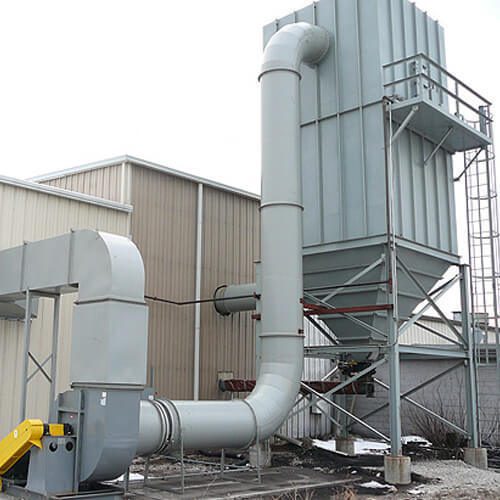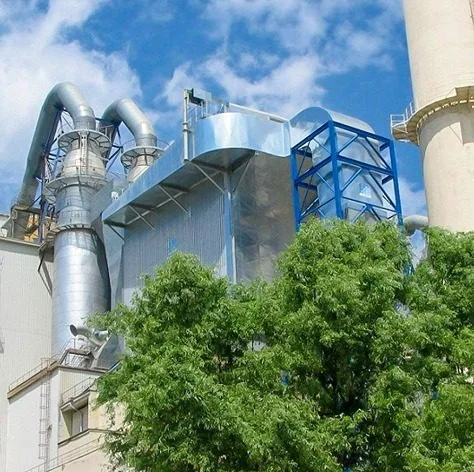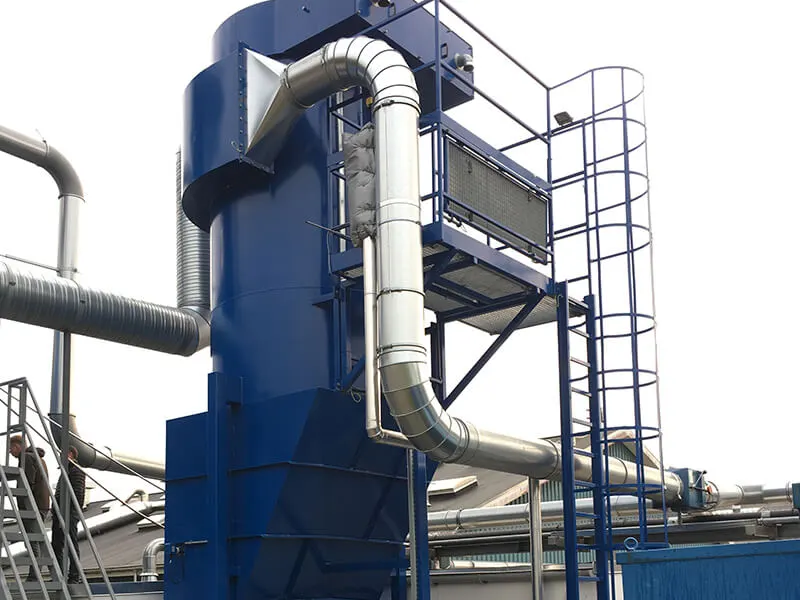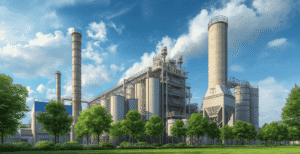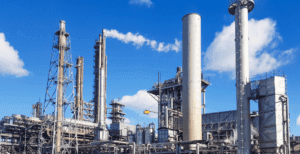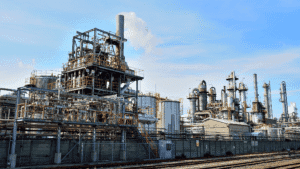Industrial environments are rarely as clean as they appear from the outside. Behind the walls of cement plants, power stations, chemical facilities, and food processing units, the air often carries more than just oxygen. It is filled with fine dust, toxic fumes, smoke, and invisible particles released during production processes. These contaminants may seem harmless at first glance, but over time they can have severe consequences—gradually eroding worker health, reducing equipment lifespan, and lowering overall production efficiency.
Dust and airborne pollutants are not just a nuisance; they are a hidden danger. Fine particulate matter can penetrate deep into workers’ lungs, leading to respiratory illnesses. Sticky or corrosive dust can accumulate inside machinery, clog filters, and cause unplanned breakdowns. Even in industries like pharmaceuticals or food processing, where cleanliness is paramount, microscopic contaminants in the air can compromise product quality, leading to rejections, recalls, or safety hazards.
This is why أنظمة تنقية الهواء play such a vital role. Far beyond being just another piece of equipment, they serve as the silent protectors of industrial operations—shielding workers from health risks, safeguarding equipment from damage, and ensuring that production flows smoothly without costly interruptions. In other words, they are the unseen guardians of workplace safety and the hidden drivers of efficiency.
Protecting What Matters Most: Worker Health
At the heart of every thriving business is its workforce. Skilled employees are the backbone of productivity, but in industrial plants, they often work in environments where the air itself can be a silent threat. Dust particles, welding fumes, chemical vapors, and microscopic pollutants are not just irritants — over time, they can cause serious health complications.
Without effective air filtration, workers may face:
- Respiratory illnesses such as asthma, chronic bronchitis, or even long-term conditions like silicosis and lung disease.
- Skin and eye irritation from exposure to harsh chemical particles.
- Slow-developing chronic illnesses, which build up silently after years of breathing contaminated air.
This not only puts employees at risk but also impacts productivity, as frequent sick leave, fatigue, and health concerns can reduce efficiency on the shop floor.
Air filtration systems serve as the first and most reliable line of defense. By capturing harmful particles and gases before they spread into the breathing zone, they create a safer, healthier environment. The difference is noticeable — fewer health-related absences, reduced medical claims, and most importantly, a workforce that feels protected, valued, and able to perform at its best.
Powering Productivity with Cleaner Air
The benefits of clean air go far beyond protecting people — they directly influence how efficiently a business operates. Dust and airborne pollutants are often the silent enemies of productivity. They clog sensitive equipment, slow down operations, and even compromise the quality of finished products. Over time, this hidden damage leads to higher costs, more downtime, and frustrated customers.
With the right air filtration system in place, these challenges can be turned into advantages:
- Protecting Machinery: Fine dust and particles may seem harmless, but they can settle inside machines, clog filters, and wear out moving parts. Filtration keeps equipment cleaner, helping it run longer with fewer breakdowns and reducing the need for costly repairs.
- Ensuring Consistent Product Quality: In precision-driven industries like pharmaceuticals, electronics, or food processing, even microscopic airborne contaminants can ruin entire batches. Air filtration safeguards product integrity, ensuring every unit meets strict safety and quality standards.
- Cutting Energy Costs: Modern air filtration systems are designed for efficiency. By maintaining smoother airflow, they reduce the load on fans and HVAC systems, which translates into significant energy savings while keeping facilities comfortable and safe.
- Staying Compliant with Regulations: Governments and industry bodies enforce strict rules on emissions and workplace safety. Clean air solutions not only help meet these requirements but also strengthen a company’s reputation as a responsible and sustainable operator.
When the air is clean, everything runs more smoothly — machines last longer, processes remain reliable, and businesses save both time and money. In short, air filtration is not just about compliance; it’s about building a more efficient, resilient, and profitable operation.
The Business Case for Clean Air
For many industries, air filtration is often seen as nothing more than a regulatory checkbox — something necessary to stay compliant. But forward-thinking companies view it in an entirely different light: a strategic investment that delivers measurable returns.
Cleaner air brings multiple advantages that go straight to the bottom line:
- Reduced absenteeism: Healthy employees show up more consistently, stay engaged on the job, and deliver higher levels of performance.
- Significant cost savings: Cleaner machinery and production lines mean fewer breakdowns, less maintenance, and minimal downtime — all of which add up to greater efficiency.
- A stronger reputation: Businesses that actively protect their people and the environment earn trust, not only from employees but also from regulators, partners, and customers.
In simple terms, clean air pays for itself. The upfront investment in a robust air filtration system is quickly outweighed by the savings it generates and the long-term value it creates — from healthier teams to smoother operations and a stronger brand image.
Where Air Filtration Matters Most
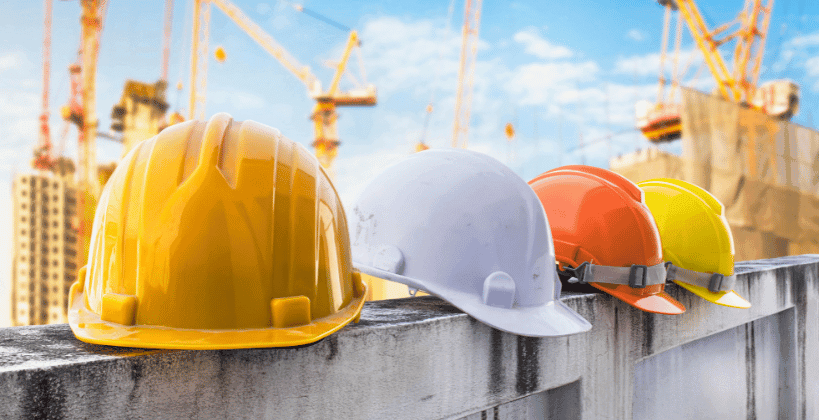
Every industry has its own set of challenges, but one issue cuts across them all — air quality. No matter the sector, managing airborne pollutants is critical to protecting people, equipment, and products.
- Cement plants generate massive amounts of dust during crushing, grinding, and material handling.
- توليد الطاقة facilities face the challenge of ash, smoke, and gaseous emissions that can harm both workers and equipment.
- Metal industries deal with welding fumes, grinding dust, and fine particulates that pose serious health and safety risks.
- Chemical plants release vapors and hazardous compounds that require strict air control to prevent exposure.
- Food and pharmaceutical facilities demand particle-free, sterile environments where even the smallest contaminants can compromise product integrity.
In all these environments, air filtration is not an optional add-on — it’s a necessity. It is the only way to safeguard workers’ health, ensure consistent product quality, and keep operations running smoothly without costly interruptions or regulatory setbacks.
Conclusion: Clean Air, Stronger Industry
Air filtration systems may operate quietly in the background, but their influence touches every corner of an industrial plant. They safeguard workers from harmful exposure, extend the life of equipment, and create a cleaner environment where productivity and quality can flourish.
Clean air is far more than a matter of compliance — it reflects a company’s commitment to its people, its processes, and its future. Industries that invest in effective air filtration are not just protecting today’s operations; they are building a foundation for long-term growth, resilience, and sustainability.
For any business that aspires to thrive in a competitive world, choosing the right air filtration system isn’t optional. It’s a strategic decision — one that ensures healthier employees, stronger performance, and lasting success.
اكتشف مجموعة الحلول لدينا:
الأسئلة الشائعة
An air filtration system is a setup (device or integrated system) designed to remove airborne particles, dust, allergens, pollutants, gases, and microorganisms from the air. It “cleans” the air by passing it through one or more filter media, traps contaminants, and releases cleaner air back into the environment.
Air filtration systems are essential because they directly impact both human health and equipment efficiency. In residential and office environments, they reduce allergens, mold spores, bacteria, and harmful pollutants that can trigger respiratory issues or worsen allergies. In industrial sectors like cement, steel, food, and pharmaceuticals, they protect machinery from dust damage, maintain product quality, and ensure compliance with strict environmental regulations. By providing cleaner air, these systems improve comfort, safety, and long-term operational efficiency.
There are several types of air filtration systems, each designed for specific needs. HEPA and ULPA filters are best for capturing extremely fine particles, making them popular in healthcare and pharmaceutical industries. Activated carbon filters are used when the removal of odors, volatile organic compounds, or chemical gases is required. Electrostatic precipitators rely on electric charges to attract particles, while wet scrubbers and cyclones are more common in heavy industries where dust concentrations are very high. Many modern systems combine different technologies to maximize efficiency across a wide range of pollutants.
Filter replacement frequency varies based on the environment and filter type. In residential or office use, filters often need replacement every three to six months, while in industrial applications with heavy dust loads, maintenance may be required more frequently. Washable filters may be cleaned and reused, but most high-efficiency filters, such as HEPA or carbon filters, must be replaced periodically. Regular maintenance is critical because clogged filters reduce airflow, increase energy consumption, and compromise the overall efficiency of the system.

